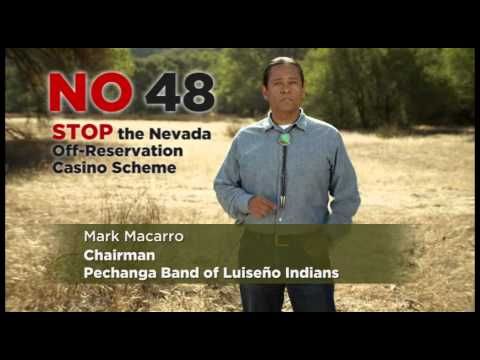Federal judge moots CA casino oversight
 In what amounted to a tart reminder to California voters that they have limited authority over sovereign Indian tribes, a federal judge has ordered Gov. Jerry Brown’s administration to renew negotiations with North Fork Rancheria of Mono Indians officials over the tribe’s plan to build a casino in the Madera area off Highway 99, about 30 miles north of Fresno.
In what amounted to a tart reminder to California voters that they have limited authority over sovereign Indian tribes, a federal judge has ordered Gov. Jerry Brown’s administration to renew negotiations with North Fork Rancheria of Mono Indians officials over the tribe’s plan to build a casino in the Madera area off Highway 99, about 30 miles north of Fresno.
State voters last November rejected Proposition 48, which would have ratified Brown’s and the Legislature’s approval of the proposed $350 million, 2,000-slot machine casino. Opposing the ballot measure was largely supported by the state’s editorial pages on the grounds that the casino would be built on land purchased by North Fork Rancheria that’s more than 30 miles from tribal lands. The fear was this would set up a precedent for a sharp expansion of Indian casinos in heavily populated urban areas.
But the main groups funding the push to reject Proposition 48 were Indian tribes who didn’t want to see their market share reduced, not civic activists worried about gambling expansion. U.S. District Court Judge Anthony W. Ishii’s ruling appears to clear the way for such an expansion. This is from the Fresno Bee:
Ishii said federal law requires the governor to negotiate with the tribe and conclude compact negotiations within 60 days. If both sides can’t reach agreement, the judge will appoint a mediator. The state and the tribe will then have 60 days to present a final offer for the mediator’s selection.
The North Fork tribe argued that under federal Indian gambling law, the power rested in the hands of a federal judge to order the governor back to the table and, if necessary, select a mediator to choose between a state-proposed compact and one from the tribe. The complaint was filed after the governor’s office sent a letter to the tribe’s lawyers declining further negotiations.
“The state does not now contend that any of the (Department of the Interior) secretary’s determinations were incorrect, nor does it articulate a basis for its refusal to negotiate regarding the Madera parcel,” the judge said in requiring the governor to negotiate.
Construction of the North Fork casino would be paid for by Station Casinos, the Las Vegas company that would operate the facility and share profits with the tribe.
Senate president worries about rapid gambling expansion
The federal court’s ruling is likely to be treated with alarm by some state lawmakers. State Senate President pro Tem Kevin de Leon has a history of raising concerns about off-reservation casinos. In July 2013, he wrote a letter to Gov. Jerry Brown in reaction to approval of the North Fork project.
“I am deeply concerned by the current ad hoc process of approving off-reservation gaming projects which does not sufficiently protect state interests and our residents,” he declared.
But Brown has been working much more closely with Indian tribes to advance their casino projects, at least their non-controversial ones, than his predecessor, Arnold Schwarzenegger.
The Republican actor-turned-politician used his 2003 recall campaign as a platform to demand that Indian tribes share their gaming revenue with the state. Subsequent deals his administration cut with tribes were conditioned on such revenue sharing. But in 2011, the 9th U.S. Circuit Court of Appeals held up a trial court summary judgment ruling throwing out any such state requirements. The blistering opinion mocked the state of California’s official position that demanding a cut of tribal gaming revenue wasn’t really a tax.
“No amount of semantic sophistry can undermine the obvious: a non-negotiable, mandatory payment of 10 percent of net profits into the state treasury for unrestricted use yields public revenue, and is a ‘tax,’” the ruling held.
Brown’s administration chose not to appeal the ruling to the U.S. Supreme Court. That suggests the governor, a Yale Law School graduate, expected the North Fork ruling but didn’t want to resume negotiations with the tribe until ordered to by a federal judge so as to not seem to be defying voters’ rejection of Proposition 48.
Chris Reed
Chris Reed is a regular contributor to Cal Watchdog. Reed is an editorial writer for U-T San Diego. Before joining the U-T in July 2005, he was the opinion-page columns editor and wrote the featured weekly Unspin column for The Orange County Register. Reed was on the national board of the Association of Opinion Page Editors from 2003-2005. From 2000 to 2005, Reed made more than 100 appearances as a featured news analyst on Los Angeles-area National Public Radio affiliate KPCC-FM. From 1990 to 1998, Reed was an editor, metro columnist and film critic at the Inland Valley Daily Bulletin in Ontario. Reed has a political science degree from the University of Hawaii (Hilo campus), where he edited the student newspaper, the Vulcan News, his senior year. He is on Twitter: @chrisreed99.
Related Articles
SB 776 bumping off prevailing wage compliance
A big labor union in the state wrote a bill to defund a non-profit that actually recovers money for workers
Chart Shows Jobs Stagnation
John Seiler: One thing I keep blogging about is that the U.S. economy really has not grown in about 13
Revolutionary pension game-changer, or bigger pension problems?
July 10, 2013 By Katy Grimes There is a potentially revolutionary way of restructuring public pensions being floated by U.S.



